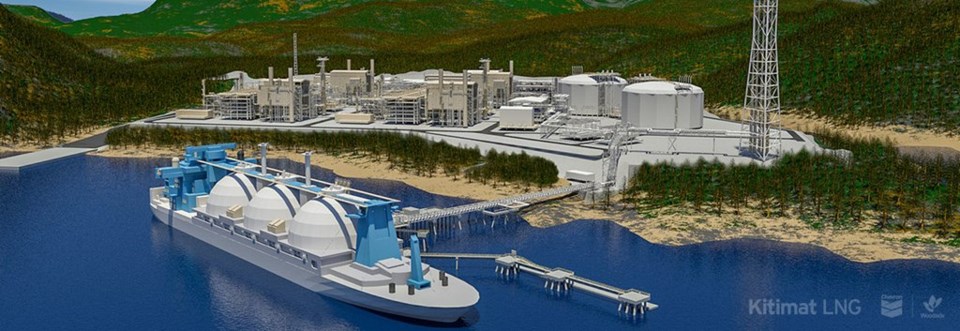Businesses and consumers can look forward to softening oil and natural gas prices in 2024, according to Deloitte Canada, and investment in B.C. energy projects could pick up, including increased drilling in anticipation of the start-up of the LNG Canada project in Kitimat.
In a 2024 energy price outlook, Deloitte Canada notes that crude oil prices have fallen to their lowest price point in two years. That is partly due to increased production in the U.S., and cuts to production by OPEC.
Both crude oil and natural gas prices have normalized, following three years of shocks – starting with a pandemic that drove prices through the floor, and resulted in reduced investment in oil and gas production in North America, followed by an energy crisis and war between Russia and Ukraine that then drove prices through the roof.
“Industry responded,” said Andrew Botterill, national oil, gas and chemicals leader at Deloitte Canada. “So (because of) the high prices and tight supply, the industry was out drilling more and more.
“What we’re seeing, both here in Canada and globally, is a general softening of prices, and we’re seeing much more moderate natural gas prices and oil prices.”
The first half of 2023 was marked by volatility, with West Texas Intermediate (WTI) oil prices peaking at US$90 per barrel in September 2023, and gasoline prices in Vancouver spiking to $2.12 per litre.
By late 2023, however, oil and natural gas prices had both returned to something resembling normal.
“Continuing cuts in crude oil supply by OPEC+ countries coupled with record-high production in the United States and expectations of softening demand growth have combined to push global oil prices to their lowest levels in more than two years,” Deloitte Canada notes.
Deloitte Canada is now expecting WTI oil prices to be in the US$70 per barrel range in 2024.
Oil prices are not the only thing that affects gasoline and diesel prices, however, and Dan McTeague, president of Canadians for Affordable Energy, cautions that moderating oil prices are no guarantee that gasoline and diesel prices will be insulated from volatility in 2024.
“The underlying assumption of lower energy prices is not a bet I’d make, especially given the markets seriously discounting global geopolitical tensions, or assuming we won’t experience any major supply disruptions like hurricanes or refinery snares,” he said.
North American natural gas prices were also subject to volatility – mainly in 2022 -- as a result of sanctions against Russian natural gas, which resulted in increased exports of natural gas from the U.S. to Europe in the form of LNG.
Increased oil and gas production in the U.S. and a mild winter have helped push North American natural gas prices back down to a more normal price range.
“We could expect to see lower natural gas prices this year than we saw last year, which means, on the consumer side, it will be less for you and I to heat our homes,” Botterill said.
With LNG Canada planning to begin its startup in 2024 – a process that can take as long as one year – Botterill said B.C. might expect to see an increase in upstream activity later this year.
“We may see companies that are going to deliver (natural gas) into that plant start to ramp up drilling and activity in preparation for that,” he said. “We could see companies deploying capital in B.C. to be ready for that big LNG plant to turn on.”
The Deloitte report also notes increased investment in value-added fossil-fuel based projects in Western Canada, like new petrochemical plants in Alberta and new liquefied petroleum gas (LPG) terminals in B.C.
“In the last 12 months -- just as advisers here in energy in Canada -- we’ve seen a lot more appetite for projects on the West Coast for export of lots of different products, whether it be LPG or rail terminals,” Botterill said.
There are currently two LPG terminal projects proposed for Prince Rupert. One is the Ridley Island Energy Export Facility (REEF), a joint venture between AltaGas (TSX:ALA) and Royal Vopak that will export LPG, methanol, and other bulk liquids. A second proposal is a new LPG export terminal that Trigon Pacific Terminals (formerly Ridley Terminals) plans to develop.
Botterill noted that First Nations are increasingly involved in advancing a number of these energy projects.
Two of the projects are LNG terminals – the Haisla Nation’s Cedar LNG project, and the Nisga’a Nation backed Ksi Lisims project.
“I think that’s really changed how these projects are moving forward,” he said.




